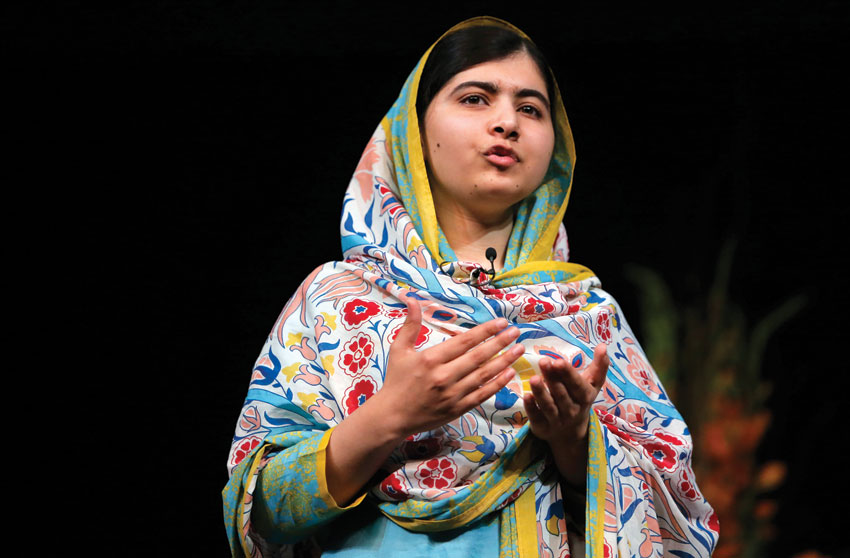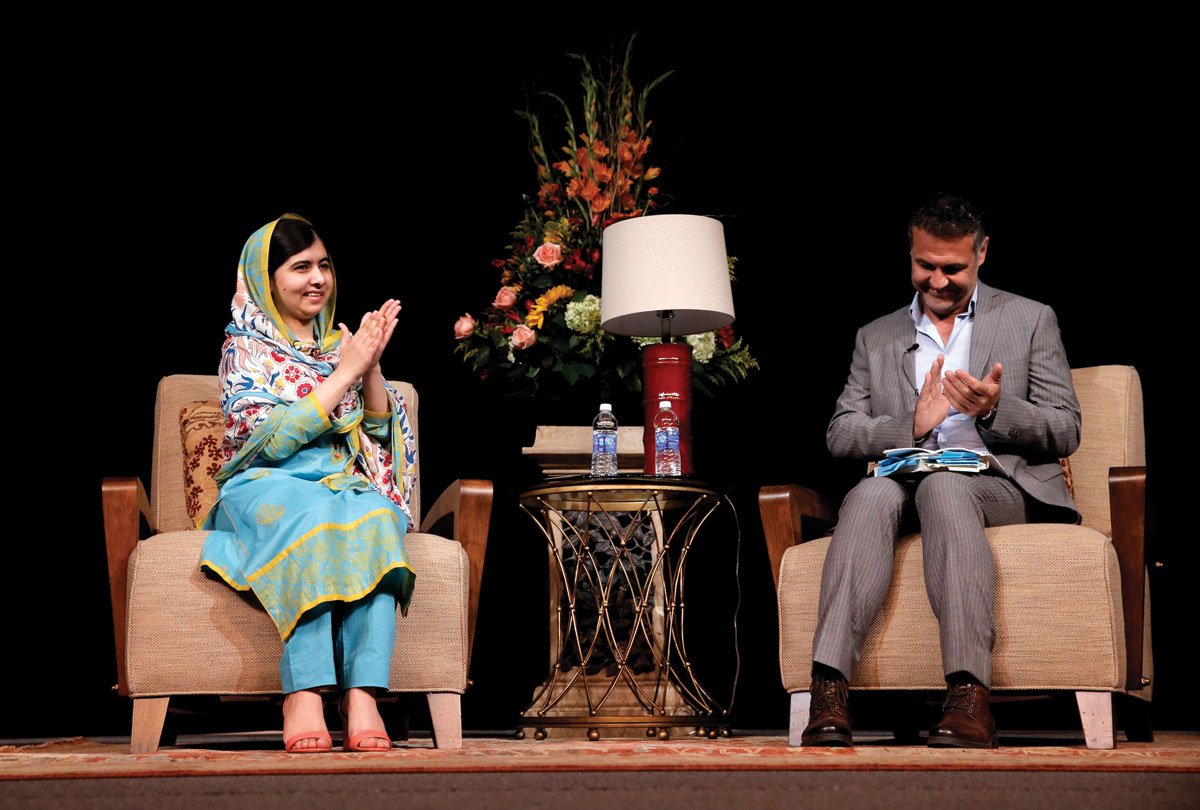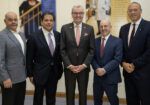MALALA YOUSAFZAI IN SAN JOSE
Malala Yousafzai talks with Khaled Hosseini in San Jose, Calif., June 26. (Photo courtesy: Michael Macor | San Francisco Chronicle)
Malala Yousafzai, the youngest ever recipient of the Nobel Peace Prize, was in Silicon Valley at the event center of San Jose State University, June 26, where she spent over an hour addressing the audience and engaging in a conversation with acclaimed Afghan American author Khaled Hosseini to the delight of the approximately over 4,000 people present, writes Ras Siddiqui.
Malala’s visit here was preceded by her appearance in Denver where she headlined a sold out event at the Bellco Theater, June 24, where she also expressed her belief that schooling is a right for every child, and it should never be denied.
Khaled Hosseini himself put it best when he said in his introduction that she is someone that the entire world now knows by her first name “Malala,” which to millions today now stands for “courage, passion and hope.” He added that on October 9, 2012 in the town of Mingora, Swat Valley, Pakistan, gunmen stopped a van going to school and asked which passenger was Malala? And when some of the girls looked in Malala’s direction, one gunman fired, and technically he shot the girl he meant to shoot “but in every other way, he shot the wrong girl,” said Hosseini to rousing applause. He added that if the gunman thought that he was going to quiet her and end her story, he was quite wrong. “His intended victim became the youngest person ever to win the Nobel Peace Prize,” he said. Khaled also explained that she has established the Malala Fund to champion the voices of children and girls access to education. He also mentioned that Malala will be the subject of a documentary to be released, Oct. 2, called “He Named Me Malala” and that the official trailer would be presented here tonight.
Malala took to the stage started her speech with the traditional “Bismillah Hir Rahman Nir Raheem” (In the name of God, the most Merciful, the most Beneficent). She said that she was just a 17-year-old girl from Pakistan’s most beautiful place called Swat Valley where she was leading a peaceful existence, going to school, learning every day and happy with her life. But things did not remain same and suddenly (like in a movie) a change came. The terrorists who appeared did not believe in women’s rights. They did not believe in this idea of women having an identity and they blasted (blew up) more than 400 schools at that time there. She said that she was one of the thousands of girls who could not go to school so she decided that this was the time to raise her voice and speak up. She said that if she had not chosen to speak up, she would have spent her whole life in that situation. “My belief was, that if you want to change your society, if you want to see the change, then you have to step forward to bring the change,” she said. And this is how her journey started, she added.
Malala continued that today she was standing here seeing people supporting her and are standing with her in supporting education. She said that from the beginning she was speaking of her right to go to school. And that is how she ended up speaking for the rights of all girls in Pakistan and that now she was speaking up for every girl around the world. She thanked everyone for their support. She added that this support is keeping her strong and that she hoped for a happy ending to the story of her efforts in life.
In her follow up conversation with Khaled Hosseini she was able to touch on a number of topics.

Hosseini briefly dwelled on the fact that she described herself as (Swati) Pashtun and Pakistani and on her affection for her beautiful Swat Valley. Malala said when she woke up in a hospital in Birmingham (after the attack on her) and when she was able to look outside the window she wondered where she was because she did not see the beautiful forest or the rivers (that the Swat Valley is famous for). She spoke about missing her friends and family. She then took the opportunity to introduce her father Ziauddin Yousafzai who was here at the event and befittingly applauded by the audience. Malala also publicly appreciated her dad here for not restricting her mother to remain inside the house, not practicing gender inequality in their home and for encouraging her and making her who she was today.
When Hosseini pointed out how in her Pashtun family, her father was very happy that she was born a girl and how he was her mentor, Malala elaborated that her father also strongly believed in non-violence and freedom of speech, freedom of expression and that is what led her to speak up. She said that just because it is a tribal society did not mean that women should have all kinds of restrictions and not work or pursue their goals. She said that her father was totally against those ideas (restrictions).
She added that her father had been a truly inspiring father but that she does sometimes fight with him and that she just had recently had a fight with him in the car (generating plenty of laughter at this venue)! She also elaborated on her father’s efforts to build and run a school in Swat, in a very conservative environment for girls. Malala’s mother and her efforts were also very positively highlighted by her.
Since it is just not possible to encapsulate the rest of the evening into a few more sentences here, we will skip the details about views expressed on the conservative Pashtun society that is very much present in both Afghanistan and Pakistan today. What we will do here is jump to the resistance that Malala has come to face ever since she has found fame, especially since she won the Nobel Peace Prize. Khaled Hosseini has also faced such labeling and it pretty much boils down to their exposing the negatives present in their societies, especially ones that make them look bad. Khaled “was not supposed to write about” the delicate subject he covered in his first novel “The Kite Runner” (even my review of the movie based on the book was not well received in parts of Pakistani society) and Malala was supposed to quit school and do what the extremists say?
Ironically, Malala is criticized for making Pakistan and Islam look bad but in reality she has been making both look good wherever she goes. And one just cannot continue to hide reality for the sake of keeping up a false image. The problem of intolerance and extremism in parts of her society is very real.
There were some aspects of this event that prevented even more participation. Our own media was not invited to attend (nor was any video or picture taking allowed by anyone except a select few). Some took it as a hint that Malala does not belong to her country of origin anymore. And there are those in our community who believe that Malala’s Nobel was just politically motivated. And some point out that Pakistan’s own male “Mother Teresa” the currently ailing Abdul Sattar Edhi is far more deserving of that award. For those I would add here that Edhi Sahib is possibly too good for the Nobel. And since the Nobel Committee has in its recent history awarded the Peace Prize to further a political agenda on more than one occasion, what is the problem with them awarding it to Malala? Her quest to bring education to children, especially girls in conservative male dominated societies worldwide is truly commendable and warrants our support. She deserves every award and accolade that she gets because she is doing what is right. What is shameful is that she was shot in the first place!


